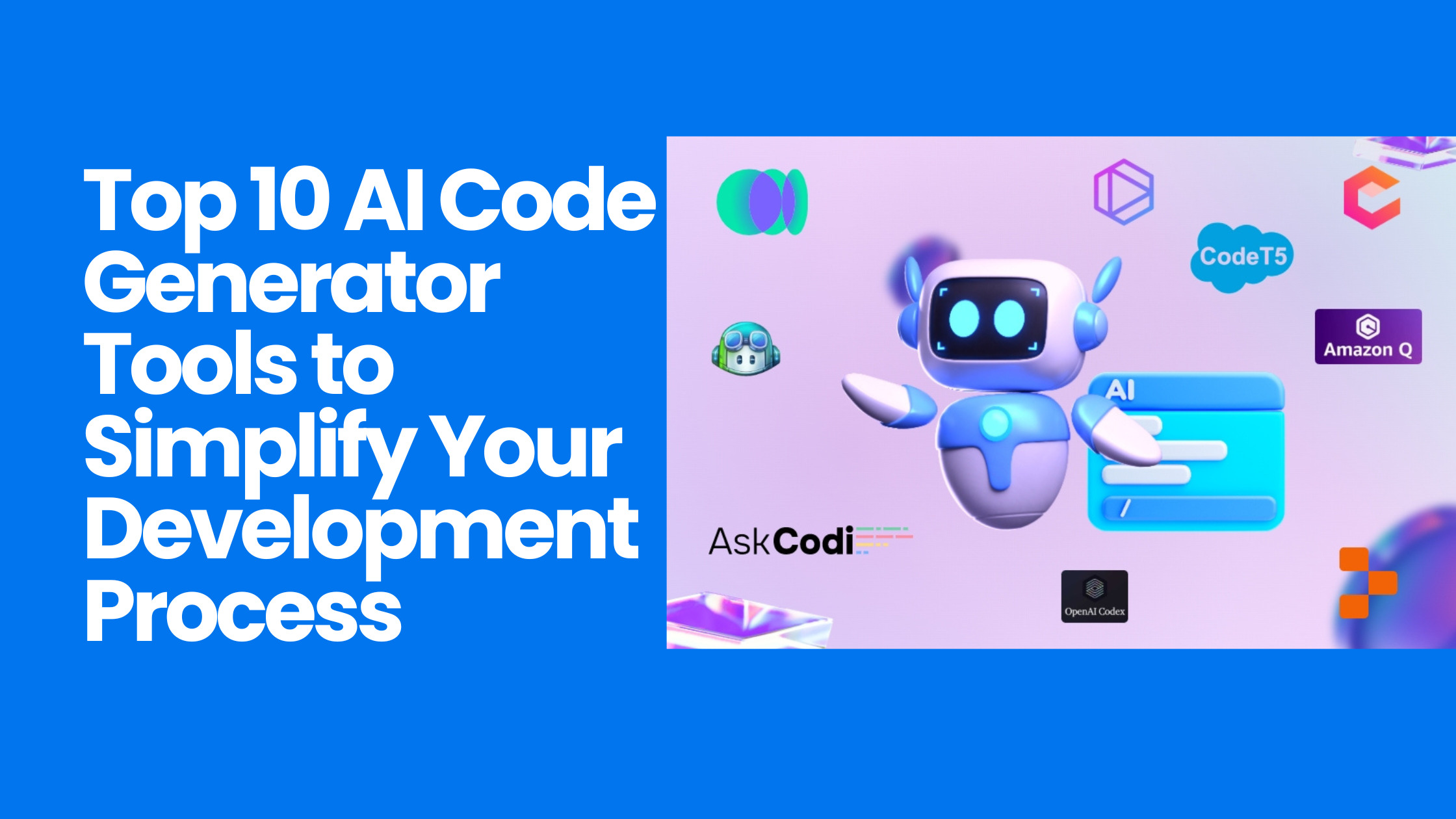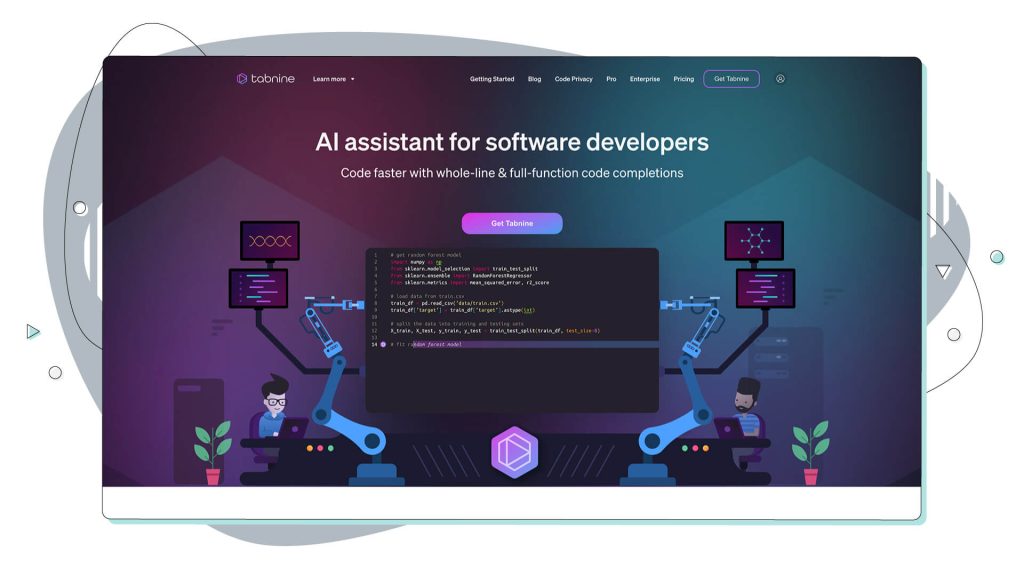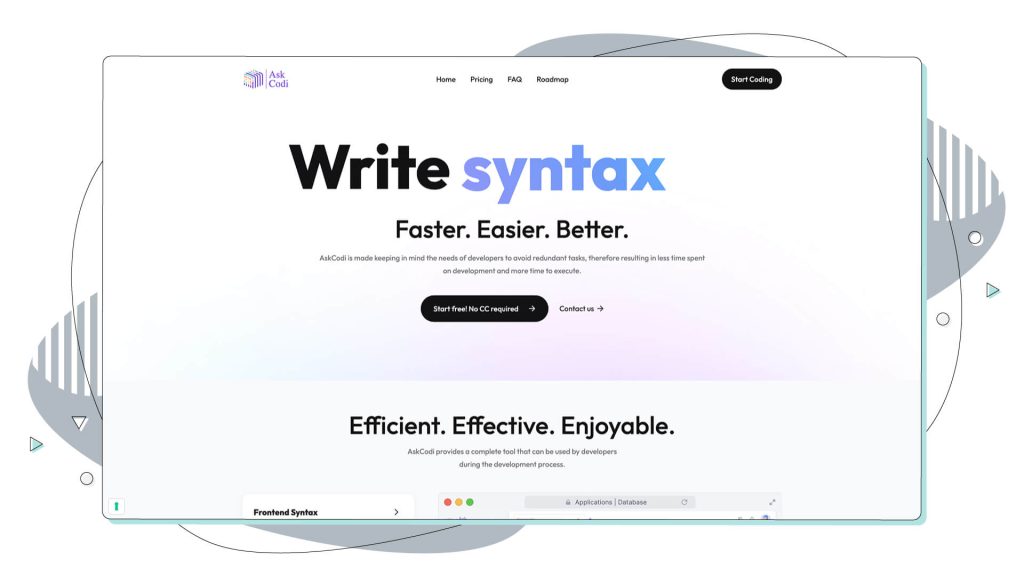
Top 10 AI Code Generator Tools to Simplify Your Development Process
- 12 best coding ai tools
- October 29, 2024
- No Comments
In recent years, the software development landscape has seen a dramatic evolution with the introduction of artificial intelligence technologies. Among these innovations, AI code generators have emerged as transformative tools that can significantly reduce development time and improve efficiency. By automating the coding process, these advanced systems allow developers to focus on more strategic tasks, ultimately enhancing both productivity and creativity in software engineering. In this blog post, we will explore the top 10 AI code generators available today, delve into their functionalities, benefits, and implications for the future of software development.
Top 10 AI Code Generators: Revolutionizing Software Development

The advent of AI code generators marks a turning point in how software is developed. This technology leverages machine learning algorithms to assist or even fully automate the coding process, offering developers new ways to streamline their workflows.
Understanding AI Code Generation Technology
At its core, AI code generation involves using algorithms to analyze existing code patterns, natural language requirements, and user inputs to produce functional code. These generators are trained on massive datasets encompassing various programming languages, frameworks, and coding conventions.
The technology utilizes techniques from natural language processing (NLP) and deep learning to understand user intents and translate them into executable code snippets. This functionality not only reduces human error but also ensures that the generated code adheres to best practices and industry standards.
The Rise of No-Code and Low-Code Platforms
AI code generators play a crucial role in the growing no-code and low-code movement. These platforms empower non-technical users to build applications without needing an in-depth understanding of programming languages. With AI code generators, even those with minimal technical skills can rapidly prototype and develop software solutions, democratizing access to technology.
As a result, businesses can accelerate innovation cycles, respond faster to market demands, and enhance collaboration between developers and non-developers alike. This shift has significant implications for teams working in agile environments where adaptability and speed are essential.
Key Players in the AI Code Generation Space
Several prominent AI code generators have surfaced in the tech ecosystem, each offering unique features and capabilities. These include OpenAI’s Codex, GitHub Copilot, Tabnine, and many others. As we move forward in this post, we will provide detailed insights into the top contenders in the AI code generation market, evaluating their specific strengths and use cases.
Demystifying AI Code Generators: How They Work and What They Can Do

To fully appreciate the potential of AI code generators, it’s important to understand the underlying technologies that power them and the range of applications they serve.
Machine Learning Algorithms and Neural Networks
AI code generators rely heavily on machine learning algorithms, particularly neural networks, which emulate human cognition.
These algorithms are trained on vast amounts of code from repositories like GitHub and Stack Overflow, allowing them to discern patterns, structure, and context within the code. This training enables them to generate relevant code snippets based on user queries, minimizing manual input while maximizing accuracy and relevance.
As these models learn over time, they can adapt to different coding styles, frameworks, and libraries, making them incredibly versatile tools for developers across various domains.
Natural Language Processing Integration
Another critical component of AI code generators is natural language processing (NLP), which allows the systems to interpret human language effectively.
When developers provide descriptions or commands in plain English, NLP algorithms analyze the input and convert it into executable code. This capability reduces the gap between human communication and programming language syntax, making coding more accessible than ever before.
By streamlining the translation process, developers can spend less time deciphering complex code structures and more time innovating and refining their ideas.
Real-World Applications of AI Code Generators
AI code generators have a wide array of real-world applications across industries. From generating boilerplate code for web applications to creating scripts for data analysis, their versatility is remarkable.
For instance, startups can leverage AI code generators to expedite product development, while established enterprises can enhance legacy systems by integrating new features quickly.
Moreover, educational institutions increasingly employ AI code generators to facilitate coding lessons, providing students with instant feedback and examples as they learn.
Benefits of Using AI Code Generators: Increased Efficiency and Productivity

As organizations adopt AI code generators, they experience numerous advantages, including enhanced efficiency and productivity.
Accelerated Development Cycles
One of the most significant benefits of employing AI code generators is the acceleration of development cycles.
By automating repetitive tasks such as writing boilerplate code, testing, and debugging, developers can allocate their time and energy to more complex problem-solving and innovative design. This shift leads to shorter project timelines and quicker iterations, ultimately resulting in faster time-to-market for software products.
The ability to generate functional code from conceptual ideas allows developers to focus on refining their work rather than getting bogged down in tedious coding processes.
Enhanced Collaboration Between Developers and Non-Developers
AI code generators also foster improved collaboration between software engineers and other stakeholders, such as business analysts and product managers.
With the simplification of coding through natural language inputs, non-developers can participate actively in the development process. This collaborative approach leads to better alignment between technical and non-technical teams, ensuring that software products closely align with business objectives and user needs.
Furthermore, as non-developers contribute their insights, developers gain access to diverse perspectives that can inform and enhance their coding practices, leading to more robust and user-centered software solutions.
Reduction in Coding Errors
Coding errors can be time-consuming and costly, both in terms of resources and reputation.
AI code generators significantly mitigate the risk of common programming mistakes by adhering to best practices in syntax and logic. As these systems produce code based on extensive datasets, they are less likely to introduce bugs or oversights compared to manual coding.
Additionally, many AI code generators come equipped with integrated testing features that automatically identify vulnerabilities and suggest fixes, further reducing the likelihood of problematic code being deployed.
Evaluating AI Code Generators: Key Features and Considerations
When selecting an AI code generator, developers must evaluate various features and considerations to ensure they choose a tool that aligns with their needs and goals.
Compatibility with Programming Languages and Frameworks
The first consideration when choosing an AI code generator is its compatibility with the programming languages and frameworks you use in your projects.
Most AI code generators specialize in specific languages, so identifying a tool that supports your primary coding environment is essential. For instance, if your team predominantly works with Python, you’ll want to select a generator proficient in producing Python code, as well as one that understands popular libraries and frameworks commonly used in the Python ecosystem.
User Experience and Interface Design
A seamless user experience is vital for maximizing the benefits of any AI code generator.
Look for tools that offer intuitive interfaces, easy integration with your existing workflows, and comprehensive documentation that guides you through the initial setup and ongoing usage. A well-designed user interface enhances user engagement and encourages adoption among both seasoned developers and newcomers alike.
Additionally, consider whether the tool provides customization options, allowing developers to tailor the output according to their preferences or project specifications.
Performance and Accuracy Metrics
Before committing to a specific AI code generator, it’s crucial to assess its performance and accuracy metrics.
Examine user reviews, conduct trials, and evaluate the quality of generated code. Look for indicators of reliability, such as the frequency of code errors and the system’s ability to handle complex requests. Some tools may also offer analytics dashboards that track productivity and efficiency improvements over time, providing valuable insights into how the generator benefits your development process.
Best AI Code Generators for Python: Streamlining Development with AI
Python has gained immense popularity in the software development community due to its versatility and ease of use.
Numerous AI code generators cater specifically to Python developers, promoting streamlined coding processes and increased productivity.
OpenAI Codex
OpenAI Codex is a powerful AI code generation tool that excels in understanding and generating Python code.
Trained on a substantial dataset of code, Codex can create functions, classes, and whole modules based on natural language prompts. Its ability to comprehend complex queries allows developers to harness the full potential of Python’s extensive libraries and frameworks.
Moreover, Codex integrates seamlessly with popular development environments like Visual Studio Code, enhancing coding workflows by suggesting relevant code snippets as developers type.
Kite
Kite is another popular AI code generator designed to assist Python developers in writing high-quality code quickly.
Offering code completions, suggestions, and documentation, Kite analyzes the context and offers intelligent recommendations, allowing developers to navigate their codebases efficiently. This tool supports a wide range of IDEs and text editors, making it an adaptable choice for Python developers seeking to optimize their coding experiences.
Tabnine
Tabnine is an AI-driven code completion tool that caters to multiple programming languages, including Python.
By leveraging deep learning models, Tabnine predicts and suggests code lines based on context, enabling developers to write code faster and more accurately. With support for various IDEs and customizable configurations, Tabnine serves as a valuable assistant for Python developers looking to enhance their productivity.
AI Code Generators for JavaScript: Enhancing Web Development with Automation
JavaScript remains one of the most widely used languages in web development, and several AI code generators are tailored to meet the needs of JavaScript developers.
GitHub Copilot
GitHub Copilot is an AI-powered code completion tool that has garnered significant attention in the developer community.
Built on OpenAI’s Codex, Copilot provides intelligent code suggestions directly within the editor while developers write JavaScript code. Its contextual understanding allows it to generate entire functions or classes based on brief comments or descriptions, streamlining the coding process and enhancing productivity.
Furthermore, Copilot learns from individual coding styles over time, adapting its suggestions to align with developers’ preferences and habits.
Sourcery
Sourcery is an AI code generator focused on improving code quality and maintainability in JavaScript.
It analyzes existing codebases and provides actionable insights and refactoring suggestions to help developers write cleaner, more efficient code. By identifying potential issues and recommending optimizations, Sourcery empowers JavaScript developers to enhance their coding practices and deliver high-quality software products.
Codeium
Codeium is an emerging player in the AI code generation space, catering specifically to JavaScript developers.
This tool offers intelligent code completions, templates, and snippets, allowing developers to accelerate their coding processes. With support for both front-end and back-end JavaScript frameworks, Codeium is a versatile solution for developers looking to streamline their workflows.
Leveraging AI Code Generators for Faster Application Development
The integration of AI code generators into the application development lifecycle can yield significant advantages, particularly in terms of speed and efficiency.
Rapid Prototyping and MVP Development
One of the most compelling applications of AI code generators is their ability to facilitate rapid prototyping and the development of minimum viable products (MVPs).
By translating high-level ideas into functional code quickly, developers can iterate on concepts and gather feedback from users early in the development process. This iterative approach enables teams to refine their products based on user input, ultimately leading to more successful outcomes.
Continuous Integration and Deployment
AI code generators also contribute to continuous integration and deployment (CI/CD) practices, enhancing the overall software development workflow.
With automated code generation, developers can ensure that new features and updates are consistently integrated into the codebase without introducing errors. This practice promotes agility and responsiveness, enabling teams to deploy changes more frequently and reliably.
Moreover, by automating routine testing and validation processes, AI code generators free up developers to focus on higher-level tasks, fostering innovation and creativity.
Scalability and Maintenance
As applications grow and evolve, maintaining and scaling codebases can become complex challenges for developers.
AI code generators can alleviate some of this burden by automatically generating documentation, refactoring code, and suggesting optimizations based on changing usage patterns. This proactive approach to maintenance helps ensure that code remains clean, efficient, and scalable, ultimately extending the lifespan of software applications.
The Impact of AI Code Generators on Software Engineering Roles
The rise of AI code generators is reshaping the roles and responsibilities of software engineers within organizations.
Shifting Skill Requirements
As AI code generators become more prevalent in the industry, the skill requirements for software engineers are evolving.
While traditional programming skills remain essential, there is a growing demand for developers who can effectively collaborate with AI tools and integrate them into their workflows. This shift necessitates a focus on complementary skills, such as critical thinking, problem-solving, and an understanding of AI technologies.
Moreover, engineers must be able to guide and evaluate AI-generated code, ensuring that it meets quality standards and aligns with project requirements.
New Opportunities for Creative Problem-Solving
The automation of routine coding tasks frees up software engineers to focus on more complex and creative problem-solving.
As AI code generators take care of mundane aspects of coding, developers can dedicate their efforts to high-level design, architecture, and innovation. This shift enables engineers to engage in more strategic discussions about product direction and user experience, positioning them as valuable contributors to organizational success.
Collaboration Between Humans and Machines
The relationship between software engineers and AI code generators represents a paradigm shift in how teams approach development.
Rather than viewing AI as a replacement for human expertise, developers should embrace it as a collaborative partner that enhances their capabilities. By integrating AI tools into their processes, engineers can leverage the strengths of both humans and machines, leading to improved outcomes and more innovative solutions.
Future Trends in AI Code Generation: The Next Frontier of Software Development
The field of AI code generation is rapidly evolving, and several trends are shaping its future.
Continued Advances in Machine Learning
As machine learning algorithms become more sophisticated, we can expect AI code generators to improve in accuracy and functionality.
Future iterations will likely incorporate advanced learning techniques that enable them to better understand complex coding requirements and produce code that adheres to specific frameworks and styles.
Additionally, as more developers contribute to open-source projects, the diversity and richness of available datasets will enhance the training processes, leading to even more capable AI systems.
Expansion into Diverse Domains
AI code generators are poised to expand beyond traditional software development domains.
From game development to embedded systems, the versatility of AI-driven tools can benefit a wide range of industries. As the technology matures, we may see specialized generators tailored to address unique challenges across various sectors, promoting efficiency and innovation.
Ethical Considerations and Governance
As AI code generation becomes more mainstream, ethical considerations surrounding its use will come to the forefront.
Issues such as intellectual property rights, bias, and accountability will need to be addressed as developers leverage AI to produce code. Organizations will need to establish governance frameworks that ensure responsible AI usage while mitigating risks associated with automation.
Choosing the Right AI Code Generator: A Guide for Developers
With numerous AI code generators available, selecting the right tool requires careful consideration of several factors.
Assessing Your Team’s Needs
Begin by assessing your team’s specific needs, including the programming languages and frameworks you primarily use, the complexity of your projects, and the level of AI integration you’re comfortable with.
Consider conducting surveys or discussions with team members to gauge their preferences and expectations regarding AI code generation tools.
Exploring Available Options
Once you have a clear understanding of your requirements, explore the available AI code generators on the market.
Conduct thorough research, read reviews, and watch demonstrations to gain insights into each tool’s functionalities and limitations. Most importantly, look for tools that offer free trials or community editions so your team can test them out before making a commitment.
Evaluating Support and Documentation
Finally, consider the level of support and documentation provided by each AI code generator.
Access to comprehensive guides, tutorials, and a responsive support team can significantly impact your team’s experience with the tool. Choose an AI code generator that prioritizes user education and offers resources to help you maximize its potential.
“Looking to learn more? Dive into our related article for in-depth insights into Best Tools For Image Generation. Plus, discover additional perspectives in our latest blog post covering [Topic]. Keep exploring with us!”

Conclusion
The emergence of AI code generators represents a monumental shift in the software development landscape. As organizations increasingly adopt these technologies, developers can expect to see heightened efficiency, improved collaboration, and enhanced productivity. By understanding how to evaluate and implement AI code generators effectively, developers can harness the full potential of this powerful tool and usher in a new era of innovation in software engineering. As we look to the future, the integration of AI code generation will undoubtedly shape the way we create, maintain, and scale software applications, making it an exciting field to watch and participate in.
Looking to learn more? Dive into our related article for in-depth insights into the Best Tools For Image Generation. Plus, discover more in our latest blog post on Top Content Creating Tools . Keep exploring with us!
Related Tools:
Image Generation Tools
Video Generators
Productivity Tools
Design Generation Tools
Music Generation Tools
For more AI tools, explore all categories by clicking here.
